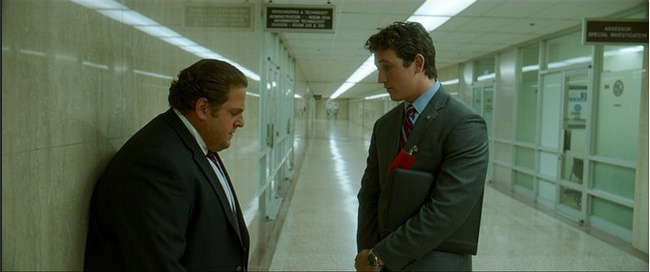Movie Review: War Dogs
By Matthew Huntley
August 25, 2016
BoxOfficeProphets.com

This “leveling of the playing field," if you will, gave the movie's ambitious but way-in-over-their-heads heroes the opportunity to earn a lot of money - legally. However, it also led them down a dangerous path on which they believed they could make even more money - illegally. And what's disturbing is their illegalities don't seem all that farfetched or hard to pull off. Worse still, the impression we get (from the movie anyway) is that the high-ranking officials who post the contracts don't seem to care all that much about how their orders get supplied, so long as they do.
Based on what eventually happens to the characters, this is not an efficient system. It does, however, serve as the basis for a good movie. War Dogs uses it, along with the traditional themes of “money is power” and “power is everything,” to tell a surprisingly engaging, coherent and entertaining fable. I write “surprisingly” because the director and co-writer is Todd Phillips (The Hangover trilogy, Road Trip), who isn't exactly known for making movies that aren't of a frivolous, slapstick, or perversely sexual nature. War Dogs raises his stature, though, because not only is the underlying material interesting and thought-provoking, but as a narrative, it constantly moves and defies our expectations with its earnest tones.
Much of the movie's success is owed to the performances and chemistry of the two leads, Jonah Hill and Miles Teller, who play Efraim Diveroli and David Packouz, a pair of 20-somethings who've recently reunited and dive headlong into the military arms industry. Hill and Teller are natural and convincing on-screen, and we believe they really are best friends, as opposed to actors playing best friends. When they talk about their shared experiences in junior high, their conversations sound genuine, and this authenticity allows us to see them as human and care about them on a deeper level.
When Efraim returns from L.A. to their hometown of Miami, he tells David about the business he was in with his uncle, in which they bought and resold guns online. Now Efraim thinks he can take his expertise of arms even further and recruits David to work for his new shell company, AEY Inc. (just don't ask him what it stands for), which bids only on the small contracts posted on the the Department of Defense's website. “Most companies are trying to get a big piece of the pie,” Efraim says, "I make money off the crumbs." David, who's barely making ends meet as a massage therapist and bed-sheet seller, is hesitant at first, but he accepts Efraim's offer once he learns it's legit. Plus, he figures he'll need a more consistent income after his girlfriend, Iz (Ana de Armas), tells him she's pregnant.
David actually narrates the story in flashback and he's our window into this sketchy world, which Efraim says exists because “war is an economy” and everyone wants in on the action. After a series of successful bids and profitable returns, Efraim and David start to think they can make bigger deals, but their rapacious aspirations begin to cloud their better judgment, and soon they're overlooking key factors like trade embargoes that prevent them from keeping their promises to clients. But they're so driven by money and the idea of becoming one of the big dogs, they literally put themselves in dangerous territory, like “the triangle of death” in Iraq.
You'd think their horrifying experiences would urge Efraim and David to quit while they're ahead, but greed and an over-ambition to be the world's biggest arms dealers take over. When the Pentagon puts out a bid to supply an inordinate amount of supplies and weaponry to U.S. Troops in Afghanistan, Efraim and David seek the help of a wanted and notorious arms dealer named Henry Girard (Bradley Cooper) to obtain the goods. Because the Pentagon requires certain credentials and conducts a rigorous vetting process, Efraim and David also forge several documents and receipts. Needless to say, their scheme goes awry, which brings us full circle to the beginning of the movie when David is kidnapped and has one of his own products pointed at him. The question becomes how are these two amateur gun runners going to get out of their predicament, let alone survive it.
I suggest you see War Dogs to find out. It's a rich and moralistic tale that seamlessly mixes humor, action and drama. And despite its outrageous plot, Phillips manages to keep things grounded and accessible so that nothing seems over-the-top or unbelievable. Granted, he has the real-life story at his disposal, which broke in 2008, but even so, he avoids the temptation to compromise the movie's reality or its characters to the point where they become incredulous. In the end, we care about and identify with Efraim and David because we see them not as evil opportunists, but as a victims of a bad system, which dangles millions of dollars in front of anyone willing to grab for it, no matter what it takes. This doesn't excuse their behavior and they are responsible for their own decisions, but before you judge them too harshly, think back to when you were in your early 20s, poor and desperate, yet you also felt invincible. It's likely you drove through a “triangle of death” of your own.